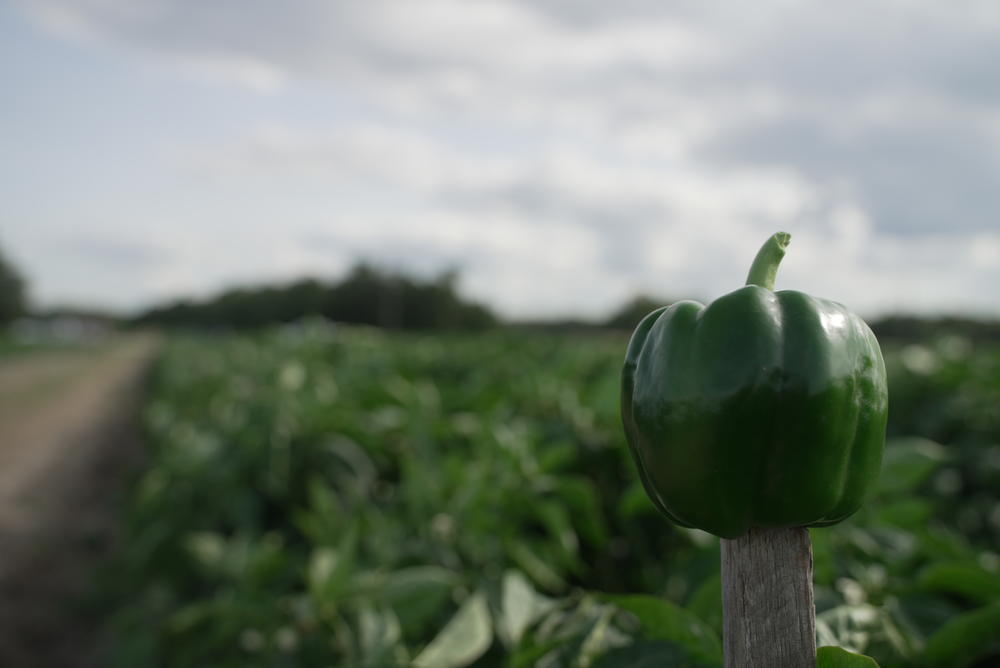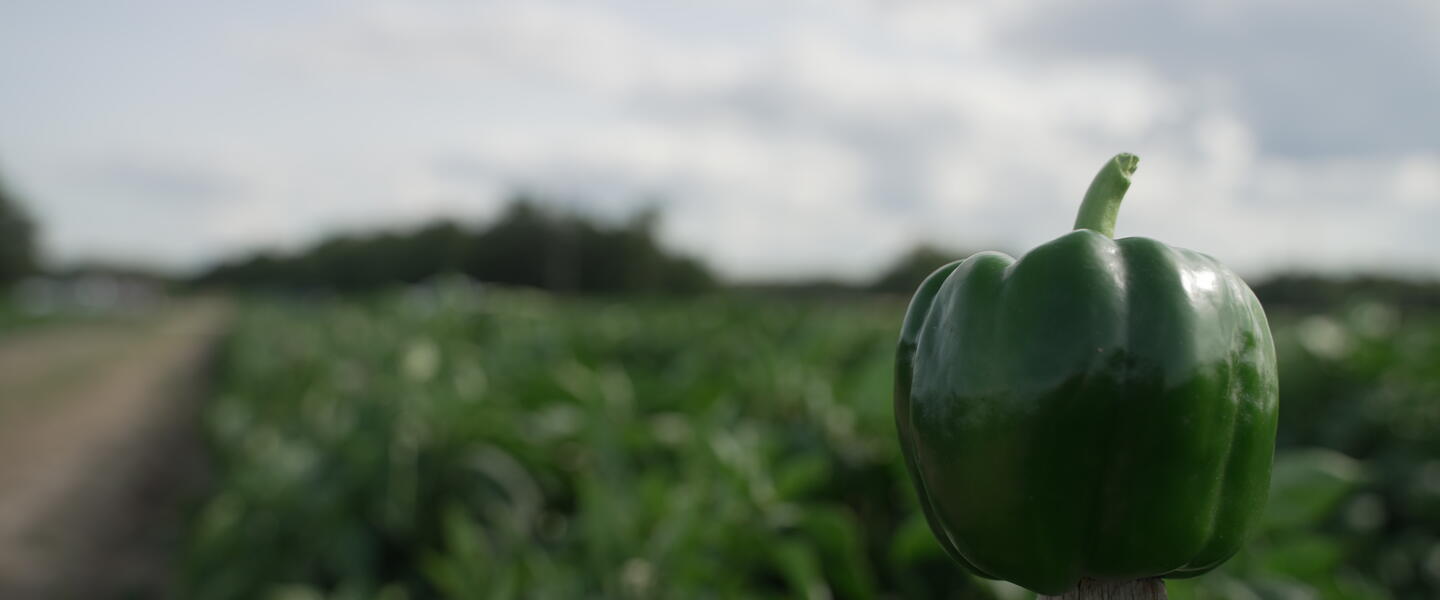
Section Branding
Header Content
A Fork in the Road Podcast: Corbett Brothers Farms
Primary Content
Dive into the heart of South Georgia's rich agricultural tradition as David Zelski takes you on a journey to Lake Park, Georgia, where Justin and Jared Corbett, the third generation of their family, carry on the legacy of bell pepper farming established by their grandfather in the 1970s. Discover how this family-owned operation has become one of the top producers of bell peppers, squash, cucumbers, eggplant, and cabbage on the East Coast, and how they've recently expanded into Georgia's emerging citrus market with their popular Besties satsumas. Learn about the challenges of farming in unpredictable weather conditions, the impact of the COVID-19 pandemic, and the innovative methods used to maintain quality control in both the picking and packing processes. Experience the Corbett brothers' dedication to their craft, love for their family heritage, and appreciation of the community they support. It's a tale of brotherly love, perseverance, and the bright future of Georgia-grown produce.

Justin Corbett: I come from a long line of farmers in the area here. My grandfather was probably one of the first ones to grow bell pepper in this area. And then, my dad carried it on from there. And, myself and and my younger brother started Brothers Farms in 2018, and we have grown from there.
David Zelski: Independently owned farms are the backbone of our agricultural economy. Today, we're visiting a farm in South Georgia which was built on brotherly love.
Theme Song: I came from the mud, there's dirt on my hands. Strong like a tree, there's roots where I stand.
David Zelski: I'm David Zelski, and this is the Fork in the Road podcast presented by Georgia Grown and the fine folks at Georgia Public Broadcasting. Each episode, we feature stories from Georgia's farmers, fishermen, merchants, artisans, chefs and others who helped provide Georgia grown products to folks in the Peach State and beyond. On this episode, we are in Lake Park, Georgia. Way, way South Georgia like five miles north of the Florida line. We're down here to spend some time at Corbett Brothers Farms. Founded in 2018 by brothers Justin and Jared Corbett. This farm is one of the top growers of green bell peppers and other vegetables on the East coast.
Justin Corbett: Bell pepper has always been our main crop. We grow a variety of other vegetables as well. We grow cucumbers, squash, eggplant, especially peppers and cabbage. Just to keep. Keep a mix of everything. Bell pepper is our main crop.
David Zelski: That's Justin Corbett. He and his brother Jared were raised on the farm. In fact, when they were kids, their very first play area was made out of produce crates. I'm sure you can imagine how that would leave a lasting impression on a child. What is it about the, South Georgia Echols County bell pepper that's so good.
Justin Corbett: Just just just our soil here and our environment. It just works out real well to grow in a quality bell pepper crop. This sandier soil that we that we're on drains well. So it it helps make a beautiful crop.
David Zelski: Like all the farms we've visited on a Fork in the Road. This one came from humble beginnings. The founders were produce pioneers for the area.
Justin Corbett: Yep. I think it was 1974. My grandfather and his brother were probably some of the first two to grow bell pepper in the area.
David Zelski: The Corbett Brothers are proud to carry on the legacy created by their grandfather and uncle, Louis and Mac Corbett, who, I guess you could say were the original Corbett brothers.
Justin Corbett: They they continued on, you know, pack, packing bell pepper under the shade at sycamore tree at grandma's house and taking it to the farmers market. And, yeah, the farm grew from there.
David Zelski: In the 1980s, Louis and Mac Corbett passed the farming business to Ken and Kim, the parents of Justin and Jared.
Justin Corbett: Dad started in 1987. Growing pepper and other variety of veg. They would they would pack it and loaded on a two ton truck and they would hold it to the farmers market as well. Dad decided to build a packing house in 2008. And started started packing ourself with others selling it. And then in 2011, we started our own sales company and, kind of kind of control the whole process from, from the grow into the sales to getting to the consumer. And in 2018, my brother and myself started Corbett Brothers Farms.
David Zelski: That's a third generation farming legacy built on hard work and no shortage of love from the family.
Justin Corbett: Come from come from a long line of, farmers in the area here. My grandfather was probably one of the first ones to grow bell pepper in this area. And then, my dad carried it on from there, and, myself and my and my younger brother started Corbett Brothers Farms in 2018. And we have grown from there.
David Zelski: At Corbett Brothers Farms. Quality and consistency are key, and that's no small task as temperatures fluctuate.
Justin Corbett: Wet weather it's, it's constantly changing in South Georgia. I mean, we're running, a week or so behind schedule this year from some late colds that we had in March and April. So yes, the weather can always throw you a curveball.
David Zelski: But when produce is in season, buying from and supporting local farms is always the right move.
Justin Corbett: When its in-season, please, please buy Georgia grown and buy American grown. When it's when it's in season. Lets support our local farmers.
David Zelski: And Justin and Jared have been able to fill their team with working folks who really know their stuff.
Justin Corbett: These are these are some of the hardest working folks that I know. They they do a good job, with with what they're doing out here. These guys picking pepper, know exactly what they're doing and do a great job of it.
David Zelski: The road hasn't always been smooth for Corbett Brothers Farms. In 2020, the global pandemic hurt their operation considerably. That's when the Department of Agriculture lent a helping hand with their farmers to familiess food box program. This was an emergency relief effort by the USDA, after small farms all over were devastated by the effects of Covid 19. The program began in May of 2020 and ended a year later, having distributed 173 million boxes of fresh food like produce, dairy, and meats to farming families all across America.
Justin Corbett: We were in a tough spot coming about midway our our our planting schedule while everything was shutting down and we didn't know where we were going to end up going with our crop. And, the Department of Ag stepped up. And we really appreciate the food box program they put together last year to help us move some product and to get stuff where it needed to be.
David Zelski: The process for getting these peppers to your dinner table all starts with the picking.
Justin Corbett: These these peppers still on the plant are still here. Here to grow their size on up and be a nice, beautiful pepper in a in a week's time for us to come back and pick again.
David Zelski: Yeah. How many rounds did you get? I see a lot of the flowers here. The pepper flower. How many rounds you get a year.
Justin Corbett: How we'll come across this field probably six different times, to, to get the full crop off of it.
David Zelski: And picking peppers requires a gentle hand.
Justin Corbett: Oh, the whole process. It's just just to to break a pod off my hand. They got to be gentle with it. And bell peppers kind of like handling eggs, you got to be real gentle, not to bruise it, but, just just break it off and we'll send it on to the packing house and let Jared do his part from there.
David Zelski: The dedication to quality and precision doesn't just stop with the picking. The packing process is also careful and deliberate.
Justin Corbett: Its all quality control. And you know, 30 years ago, everything went in a wooden crate. Today we pack pepper in 20 different kind of kind of boxes and sizes, and it's all to customer specs and whatever they need, we can make happen for them. It has helped strengthen the company. With, with with the margins continually shrinking with what we're working with, you've got to control whatever aspect of it that you can.
David Zelski: I had a chance to visit the packing facility to get a look at what this quality control looks like in action.
Justin Corbett: When the pepper comes in its own mix sizes, we bring it in, wash it, sanitize it, pick out any cool fruit. Then it comes down everything separated by size, which all basically comes down to a count per box. Everything has to meet a, specific count per box to meet customer specs. And these guys here packing it, getting it ready to head out to get to the grocery store. We're right in the middle of packing bell pepper here, right in, in some of our first picking stuff. Got some beautiful bell pepper running. Crews packing up some RPCs here that are destined to be on a truck and be on the grocery store shelf here in a couple of days.
David Zelski: Yeah, it's almost like something out of, Willy Wonka, you know, watching the boxes come through here.
Justin Corbett: My girls think makes this an amusement park in here. When they. When they come in, it looks like a playground to them. But, a lot of a lot of machinery in here that's, helping us through the process of shoveling us off. A lot different than the way they used to pack it out, out under the sycamore tree and out of the washtub.
David Zelski: That decision to move to a packing facility was an effort to produce a more consistent quality.
Justin Corbett: Ten years ago, we were packing the farm, the vegetables right out in the field on mule trains, food safety and the demand of customers to, to want a consistent, high quality product, made it made us, make the move to build this packing house here and put in a packing line capable of providing a quality, consistent product.
David Zelski: Though they primarily grow peppers, Corbett Brothers Farms also specializes in what could be the juiciest, most delicious Satsuma oranges and grapefruit. In 2022, the Atlanta Journal-Constitution called Corbett Brothers Farms a leading player in Georgia's emerging citrus market. And so, as the Corbett brothers keep the veggies coming in the spring and summer, another Corbett crop is priming up for November right along the Georgia Florida border. These Besties stake their claim. I visited Jared Corbett to learn all about it.
Jared Corbett: Its citrus season in Georgia now, and you can see these are Satsumas is what we have here. A satsuma is a seedless mandarin, super easy to peel, and I can grab one piece and I can just show you how easily they peel. Super easy. The peeling on it.
David Zelski: Oh, that's going to help a lot of kids.
Jared Corbett: And that helps. That helps a lot. This is a one of the one of my favorite characteristics on a satsuma. I mean, we always say they peel like a banana. They just just comes off super easy. Then the fruit, this a seedless piece of fruit and super sweet.
David Zelski: These little mandarins sold under the name Besties and featuring a pair of smiling satsumas right on the box, have elevated Corbett Brothers Farms to the next level. And they're just so darn cute. Tell me about the name Besties.
Jared Corbett: Besties was a name we come up with to help market our food. It was just a brand we come up with to be a name that people recognize, and it's just growing. And a lot of people are going to the store asking, asking for Besties.
David Zelski: I saw it once. I saw that little cute face on the, that's right on the Bestie satsuma. The easy peeling process makes them great for kids of all ages.
Jared Corbett: They all peel off in wedges, and the best thing about them is no seeds. So they're very kid friendly.
David Zelski: They're your little vitamin C filled Bestie. Can I try one of these.
Jared Corbett: Yes
David Zelski: I love it. It's almost softer.
Jared Corbett: A satsuma is a softer piece of fruit, and as it gets riper, it'll get softer. The fruit inside is fine. It's just what it is. The peel is separating from the meat on the inside. And that's what a lot of people will see it, and they'll feel it in and say it soft. And everybody relates soft to rotten, it's not any good. But that's, its the other way around with the satsuma.
David Zelski: And just like with the peppers. Harvesting these fruits take careful time and precision.
Jared Corbett: With satsumas, you can see them all right here on the tree. Every single one has to be hand clipped, because if you pull it off the tree, it will plug the skin out around the fruit. It'll completely pull it out. So every single one, they have clippers and they have to come in and clip the stem off then placed in the box.
David Zelski: So it's like you're pulling the the whole root out.
Jared Corbett: That's right. That's right. If you if you pull it on can you pull it. And it'll do that every single piece. If you if you pull them. It's a very labor intensive crop. I mean it's, it's everything's done by hand. There's no type of machine that can come through and pick a satsuma, because every single one has to be hand clipped. So every single one you see has been hand harvested.
David Zelski: Also, like with the peppers, harvesting takes a careful eye and noticing the color of the crop is crucial.
Jared Corbett: We come through and we check the brix content, which is the sugar level in the fruit, and we'll come through. We got to make sure we have the good color. We can't have any green in the fruit because what we want is a solid orange piece of fruit. The sugar content in them is rising daily with this cooler weather that we that we get, we ensure that customers get the premium quality that we produce.
David Zelski: Growing outdoors in an unpredictable climate like Georgia means temperature control can be a real issue. And just like you and me, these little guys need protection from the elements. And so how are they protected? Well, when it comes to heat, they get protected the same way you do when you take a trip to the beach. All right. So I see some white on some of these.
Jared Corbett: What we do to protect the fruit. And I can show you right over here you can see the, the white on the leaves. That is a sunscreen that we apply on the tree all through the summer. And that helps fruit from burning. It'll sunburn that fruit. Then it's then it's an unmarketable piece of fruit.
David Zelski: And I saw Y'all had a couple of windmills. Tell me about what those do.
Jared Corbett: Oh, yeah. We run those for frost protection. On the cold winter night, we don't have to run them all the time. Just only when the temperature dip down real low to help keep the wind blowing in the grove.
David Zelski: Having firmly established themselves in the pepper industry over three generations, moving to the citrus field was an adjustment. The spark actually came from yet another member of the Corbett family.
Jared Corbett: In 2013, our sister started a farmer's market in town selling our produce that we grow at her farmer's market. Then we had a neighbor tell us about Satsumas and wanted us to try some. So we got some trees, we planted them and we just saw how well they were growing and how how good they tasted as well. I was like, we can grow this and we can sell this right here in Georgia. So we we planted our first trees in 2013, and we have been increasing acreage every year since.
David Zelski: From innovating the pepper field to boxes of smiling satsumas at your local grocery store, it's a pleasure to watch Corbett Brothers Farms ripen on the vine, and the future is bright for their whole operation.
Justin Corbett: Corbett Brothers Farms is continually growing. We're we're we're young. And a lot of the guys, our key guys in our operation, are young and eager and ready to grow this thing.
David Zelski: For more stories like this one, you can watch A Fork in the Road on GPB-TV or any time on the GPB.org website. GPB.org/Podcasts is where you can listen to and subscribe to this podcast or download it on your favorite podcast platform.
I'm David Zelski. Thanks for listening to A Fork in the Road.
A Fork in the Road airs Saturdays at noon and Sundays at 6:30 a.m. on GPB-TV. Check your local listings for other replays throughout the week and watch all episodes anytime at GPB.org/ForkintheRoad. Please download and subscribe to the Fork in the Road podcast at GPB.org/ForkintheRoadpodcast or on your favorite podcast platform as well.







